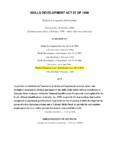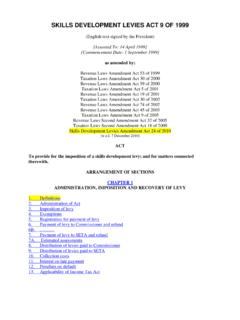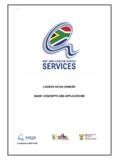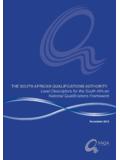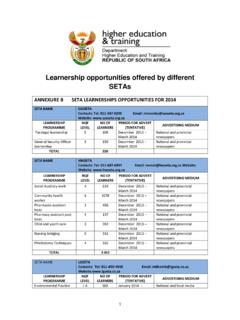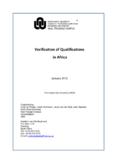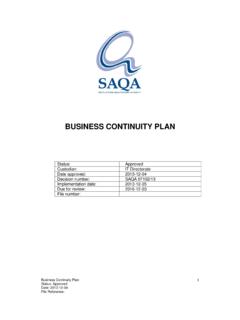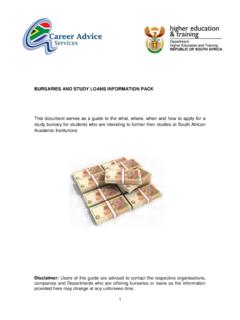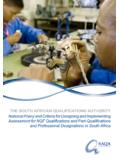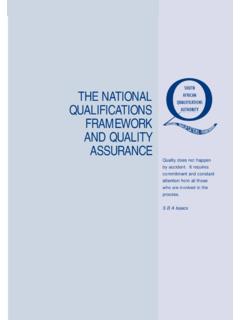Transcription of The NQF and Curriculum Framework
1 The NationalQualificationsFramework andCurriculumDevelopmentWe need systemic change,not just Curriculum orpedagogic change; weneed a new driving visionfor our system, not just anew paradigm forcurriculum design anddelivery in the classroom. Dr M NkomoWrite to us atPostnet Suite 248, Private Bag X06 WATERKLOOF, 0145 Visit us at:659 Pienaar Street (cnr. Waterkloof Road)BROOKLYN, PretoriaTelephone us at012 - 482 0800 Switchboard012 - 482 0802 Executive Office012 - 482 0836 Resource Centre and general information012 - 482 0810 Strategic Support 012 - 482 0810 Communications012 - 482 0807 Standards Setting and Development012 - 482-0858 Quality Assurance and Development012 - 482 0858 Evaluation of Educational QualificationsFax us at012 - 346 5813 Executive Office012 - 346 5809 Secretariat012 - 346 5809 Communications012 - 346 5812 Standards Setting and Development012 - 346 5814 Quality Assurance and Developmente-mail us our website date: May 2000 Funded by the European Union under the European Programmefor Reconstruction andDevelopmentCONTENTS1.
2 Introduction32. What is a qualification and how does it relate to the curriculumand Curriculum development ?43. Can the same outcomes be achieved through differentlearning programmes?84. What is the relationship between the NQF, learning programme development and delivery and outcomes-based education?105. How does the NQF description of a qualification impact onLearning programme development ?14 Planned combination of learning outcomes with a definedPurpose15 It is intended to provide qualifying learners with appliedcompetence and a basis for further learning16 Critical Cross-field Education and Training Outcomes18 Integrated assessment21 Recognition of Prior Learning (RPL)23 Credits23 Learning assumed to be in place246. Conclusion267. References278. Appendix A28 Curriculum DEVELOPMENTTHE NATIONAL QUALIFICATIONS FRAMEWORK2A publication of the South African Qualifications AuthoritySAQA s MissionTo ensure the development and implementation of aNational Qualifications Framework which contributes tothe full development of each learner and to the social andeconomic development of the nation at an introduction to this area, it may be helpful to explore what educa-tion is.
3 This may seem like an elementary question but it is one thatconstantly, throughout the recorded history of mankind, has perplexedphilosophers and thinkers. To this day, an absolute definition still escapesus. As Montaigne, the French philosopher, said when trying to find a mean-ing for the word education: The farther I sail, the more land I espy, and thatso dimmed with fogs and overcast with clouds, that my sight is so weakenedI cannot distinguish the same. Nevertheless even though there is no undis-puted definition of what education is, that does not mean that there is novalue in exploring the concept. It is in this exploration that one is able toclarify one s thinking and sort out the basic issues, and then establish somedirection for a review of the South African initiatives. A helpful place to start is the definition of education that Aristotle, the Greekphilosopher, came up with some 2 500 years ago.
4 He said the following:We must not leave out of sight the nature of education andthe proper means of imparting it. For at present there is apractical dissension on this point; people do not agree on thesubjects which the young should learn, whether they shouldtake virtue in the abstract or the best life as the end to besought, and it is uncertain whether education should beproperly directed rather to the cultivation of the intellect orthe moral discipline. The question is complicated, too, if welook at the actual education of our own day; nobody knowswhether the young should be trained at such studies as aremerely useful as means of livelihood or in such as tend to thepromotion of virtue or in the higher studies, all of whichhave received a certain number of suffrages. Nor again, ifvirtue be accepted as the end, is there any agreement as tothe means of attaining (Politics, Book V, Chapter 3,Welldon s translation)In spite of its age, this extract illustrates some of the eternal problems thatface those engaged in education.
5 What is the purpose of education? Is it thedevelopment of practical skills to enable one to earn a living? Is it theprocess of forming and strengthening character? Is it the development of themind and intelligence, the formation and understanding of concepts in theabstract? Is it the transmission or reproduction of our academic and cultur-al heritage and where possible, the improvement or transformation of thatheritage? Aristotle asks what subjects should be taught. From the 1800s thestudy of the Classics Latin and Classical Greek was the basis of the cur-riculum, society believing that only if a man had read the Classics could hebe deemed truly educated. However, since the exposure of that myth, debatehas raged the world over about what subject matter and content best meetsthe needs of society; what is it that the education system should concentrateon. More recently debates have moved across discipline boundaries andTHE NATIONAL QUALIFICATIONS FRAMEWORKCURRICULUM DEVELOPMENTA publication of the South African Qualifications Authority3 Nobody knowswhether the youngshould be trained atsuch studies as aremerely useful as meansof livelihood or in suchas tend to thepromotion of virtue orin the higher studiesAristotleinter-disciplinary studies have found favour.
6 Rousseau in turn rejected theconcept of deciding what children should learn altogether and ratherfavoured a much freer attitude, discovery learning. A further debate rages asto whether education is a process or is it an event of fixed duration? Havingraised some of the complexities, Aristotle finally hints at the problem ofhow to educate or how to become educated , by indicating that even ifthere were agreement on what its purpose is, there is no agreement as to themeans of attaining it. This assertion opens up a whole new area of debatearound pedagogy, Curriculum design, development and delivery, educationmanagement and education structures. If the question was a difficult one atthe time of Aristotle, its complexity has increased immeasurably with thetheories and discoveries in psychology and sociology in respect of how peo-ple think and learn, and the relationship between individuals and the widersociety within which they is within this context of constant debate and theorising that this discussionof Curriculum development takes place.
7 The concept that there is one cor-rect mechanism for Curriculum development and delivery is rejected andthis discussion serves only to highlight some of the guiding principles andthe problem areas for Curriculum dvelopment and delivery within the is a qualification and how does it relateto the Curriculum and Curriculum development ?It is important to explore what links exist between qualifications and thecurriculum. It may then be possible to look more specifically at the rela-tionship between qualifications and learning : means a planned combination of learning outcomes whichhas a defined purpose or purposes, and which is intended to provide quali-fying learners with applied competence and a basis for further learning; andit means the formal recognition of the achievement of the required numberand range of credits and such other requirements at specific levels of theNQF as may be determined by the relevant bodies registered for such pur-pose by the SAQA (NSB regulations) Standardmeans registered statements of desired education and trainingoutcomes and their associated assessment criteria.
8 (SAQA Act)Unit standardmeans registered statements of desired education and train-ing outcomes and their associated assessment criteria together with admin-istrative and other information as specified in these regulations. (NSB reg-ulations) Curriculum DEVELOPMENTTHE NATIONAL QUALIFICATIONS FRAMEWORKQ ualification: means aplanned combination oflearning outcomeswhich has a definedpurpose or purposes,and which is intendedto provide qualifyinglearners with appliedcompetence and abasis for publication of the South African Qualifications AuthorityLearning programmemeans the sequential learning activities, associatedwith Curriculum implementation, leading to the achievement of a particularqualification or part qualification. A learning programme can be identifiedwith a cluster of qualifications, a single qualification or a part particular qualification may be achieved through different learning pro-grammes that meet the exit level outcomes and associated assessment crite-ria of the qualification.
9 (Interim Joint Committee, 2000)This document, referring to the NCHE Report of 1996, goes on to explainthat learning programmes, while necessarily diverse, should be education-ally transformative. Thus they should be planned, coherent and integrated;they should be value adding, building contextually on learner s existingframes of reference; they should be learner-centred, experiential and out-comes-oriented; they should develop attitudes of critical inquiry and pow-ers of analysis; and they should prepare students for continued learning in aworld of technological and cultural , Curriculum , course:By programme we mean a coherentset of courses, leading to a certain degree. In a programme we can dis-tinguish a core Curriculum and optional courses, together making up thedifferent ways a student can choose to arrive at the degree.(Vroeijenstein: 1995) A definition of Curriculum is more difficult in that it means different thingsto different people and hence there is often enormous confusion when dis-cussions about Curriculum take place.
10 Definitions of Curriculum range fromrather narrow interpretations to broad, all-encompassing interpretationswhich include virtually every aspect of the full education system. It may be helpful to mention a few of these and then try and suggest howthe Curriculum relates to qualifications and standards as defined in the NQF. The Curriculum is to be thought of in terms of activity and experiencerather than of knowledge to be acquired and facts to be stored. (HadowReport) The Curriculum refers to the teaching and learning activities and experi-ences which are provided by schools (NEPI) A term which includes all aspects of teaching and learning such as theintended outcomes of learning, learning programmes, assessment,methodology ( Curriculum Framework for GET and FET) All the learning which is planned and guided by the school, whether itis carried out in groups or individually, inside or outside the school(Kerr, 1968) The overall rationale for the educational programme of an institution(Kelly, 1989) Contextualised social practice.
